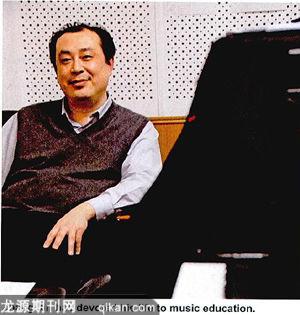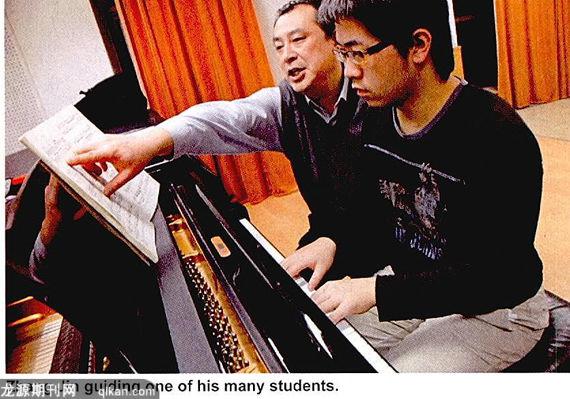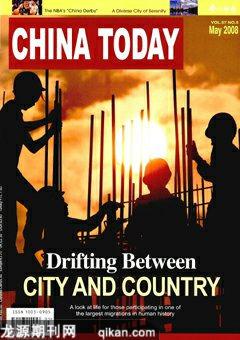A Devoted Music Educator
staff reporters LOUISE CADIEUX&HU YUE

While famous concert pianists gain widespread recognition and public accolades, equally talented musicians who dedicate their lives to music education often remain largely unknown outside a small circle of students. Zhang Jin is one such educator. Since graduating from Chinas Central Conservatory of Music (CCOM) in 1987 with a piano major, Zhang has been engaged in music education work at the affiliated secondary school of CCOM. He is presently head of piano teaching and research.
Many of Zhangs students have been admitted to noted overseas music institutions like the Juilliard School and Manhattan School of Music in the U.S., and the Liszt School of Music in Germany. His favorite pupils, Hu Bo and Jin Wenbin, are studying with full scholarships at the Juilliard School and Yale University respectively. World-renowned pianist Lang Lang is also among Zhangs former pupils. Among his current students, 17-year-old Wang Chun won first place in the Villa-Lobos International Piano Competition and fifth place in the Hamamatsu International Piano Competition, while 14-year-old Huang Nansong is the champion of the Seiler International Piano Competition.
China Today: Mr. Zhang, could you briefly tell us how you settled on music as a career?
Zhang Jin: I was born in Qingdao, Shandong Province. As my mother, Sui Wenju, is a piano teacher, I started to learn piano when I was five. She taught me fingering and scales even when she was doing the housework. As you know, starting to learn the piano is very dull, and I felt rather bored in the initial stages. Luckily, I was a well-behaved boy who heeded my parents will, so I kept practicing. Thanks to the various black gramophone records in my home, I got the chance to enjoy plenty of top-ranking classical music. Moreover, my mother sometimes invited her students and friends to play small concerts in our home. Admiring their splendid playing, I made up my mind to practice diligently.
China Today: Besides your mother, were there any other teachers who influenced you profoundly?

Zhang Jin: Certainly. Mr. Pan Yiming, a famous piano educator. After I joined the army in 1978 and entered the Song and Dance Troupe of the Air Force Political Department, I thought there must be more opportunities in Beijing and I dreamed of being admitted to a music school. Mr. Pan tutored me when I started to prepare for the entrance exam in 1981. I went to CCOM in 1983 after my demobilization, where he kept instructing me until I graduated in 1987. As he is scrupulous in scholarly work and rich in teaching skills, I learned many teaching methods from him.
China Today: How was your study experience at CCOM?
Zhang Jin: After entering CCOM, I felt my essential technique in music was inferior to that of my classmates, who had all graduated from CCOMs attached secondary school. Therefore I redoubled my efforts and caught up with the others step by step. After my junior year in university, my examination results ranked me first in the class, and the headmaster of CCOMs affiliated secondary school recruited me directly to teach in the school after my graduation.
China Today: Was it easy to make the decision to become a music educator rather than a musician?
Zhang Jin: Since I had been selected by the school based on my good grades, what followed was logical.
China Today: Would you like to tell us about your teaching style?
Zhang Jin: I always tailor my teaching plan according to the individual pupil. For a gifted and assiduous student, I will try and let him or her touch as many musical styles as possible, to broaden his or her horizon. For a common pupil, I will construct a balanced study program for him or her to lay a solid foundation in fingering skills. Cultivating a successful musician requires not only talent, but also courage and sustained effort. In addition, I often encourage my students to take part in international competitions, and invite foreign experts to my school, which is quite helpful for my pupils.
China Today: In 2007 you were a member of the judging panel of the Paris Animato Piano Competition, and you are constantly invited to join judging panels for other famous international piano competitions. How do you evaluate a students piano skill during a competition?
Zhang Jin: There are three main factors. First is their gift for comprehending the work; second is their skill, which depends on daily effort; and last is their artistic expression, or performance of the work.
China Today: Are these three factors your key to educating students?
Zhang Jin: Indeed, gifts and skill are closely related, and are the elements that take people to the top. Diligence and effort are a must to develop skill, while a gift is innate. Take Lang Lang as an example – he is a God-given genius.
China Today: As the piano is a Western musical instrument, do Chinese people face difficulties playing it?
Zhang Jin: The development of classical piano music in China presently is not as flourishing as it is in Western countries, but luckily the gap is narrowing. Chinese students are getting more chances to participate in foreign competitions and education, which helps them to exchange ideas with Western musicians and show their talents. In my opinion, Chinese people can play the piano as splendidly as Westerners, and are even more pleasant to listen to.
China Today: Nowadays Westerners also get more access to Oriental music. What is your understanding of the differences between Western and Eastern music?
Zhang Jin: This question is a little bit complicated to answer – you could write a whole research paper on it. To be brief, the two music styles represent different ways of thinking in Eastern and Western cultures. Western music stresses harmony, voice parts and concertos, while Eastern music is mostly solo. Both of them have special features and are pleasant to hear.
China Today: How is the market for Western classical music developing in China?
Zhang Jin: I think the market keeps expanding, but concert tickets are a little expensive for ordinary Chinese people, who often are not willing to pay that much to listen to a classical concert. Therefore, most of the audiences are insiders – students who study musical instruments – and their parents. However, more white collar workers are getting used to listening to concerts, to live more fully and cultivate themselves.
China Today: What are your plans for the future?
Zhang Jin: My future work will still focus on my pupils, and my hopes of cultivating more and better students. My current students, such as Wang Chun and Huang Nansong, have performed excellently in many international competitions. I wish I could create more opportunities for them to attend overseas competitions, and invite more overseas pianists to my school for exchanges.
China Today: Does your family support your career?
Zhang Jin: Yes, my wife engages in foreign trade and is excellent in English. Being busy with our careers, we dont have kids, but devote most of our energy to our work. She supports my work, and helps me contact many foreign competitions and arrange exchanges. Sometimes she accompanies my students to foreign countries as an interpreter.

